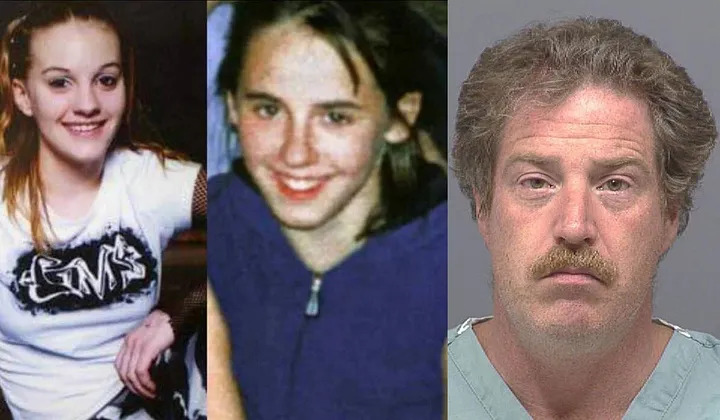The Dad Who Brutally Murdered His Daughter’s Friends

Ward Weaver III was born on April 6, 1963, in northern California, into a family that had a history of violence, which was carried down through generations of Weavers. When he was just four years old, his father, Ward Weaver Jr., abandoned him, leaving him to be raised by his mother, who later remarried a man with a drinking problem and frequently beat him with a belt.
Due to his troubled upbringing, Ward Weaver III often directed his anger towards his younger siblings, regularly subjecting his stepbrother to physical abuse and inflicting cruelty upon his youngest sister from a young age.
In April 1981, a family member accused Weaver of rape, but no charges were pressed by the police at the time as Weaver had just joined the Navy. However, by May 1982, Weaver received an other-than-honorable discharge from the Navy.
Following his discharge, Weaver brought his girlfriend from the Philippines to live with him, and they got married in August 1984. Despite having four children together, Weaver's abusive behavior and need for control persisted throughout their relationship.
Upon relocating to Bakersfield, California, Ward Weaver III had hopes of reconciling with his father, who was then standing trial for murder. According to a 1981 report by Oregon Live, Weaver Jr. had been driving a truck when he offered assistance to a couple whose car had broken down. Tragically, he went on to bludgeon the 18-year-old man to death with a lead pipe and abducted his 23-year-old girlfriend. During their journey back to his home in California, Weaver Jr. subjected the woman to repeated sexual assaults. Even more harrowing, he ultimately strangled her to death after she bit his finger.
As a result of his crimes, Weaver Jr. was sentenced to death after enlisting his 10-year-old son to help him bury the body of the woman he had murdered. He had tricked his son into believing that they were repairing a damaged sewage pipe. Weaver Jr. concealed the victim's body with concrete and built a wooden deck over the burial site, leading to a series of killings within the Weaver family.
After two failed marriages, Ward Weaver III moved into a rented home at 2507 South Beavercreek Road in Oregon City in August 1997. His 12-year-old daughter, Mallori, often spent time with her two school friends, 12-year-old Ashley Pond and 13-year-old Miranda Gaddis, who shared her interest in dance and were part of the same school dance group. Mallori frequently hosted sleepovers for Pond, Gaddis, and other friends at the Weaver residence.
As the local school bus stop was situated near Weaver's residence, Pond and Gaddis would often walk past his home on their way to school. On occasion, Weaver would offer Pond a ride to school if she was running late or had missed her bus.
In late 2001, Pond made allegations that Weaver had attempted to rape her inside his house. Although the incident was reported to the police, no charges were brought against him. During the summer of that same year, Pond had been staying at the Weaver residence to escape the tumultuous atmosphere at her own home. Tragically, both Pond and Gaddis had experienced sexual assault within their own households.
On January 9, 2002, Ashley Pond disappeared on her way to the school bus stop. Despite an extensive search effort involving the FBI and media coverage, she did not return home. As days passed with no sign of Pond, investigators began looking into the criminal history of Ward Weaver III, who lived at the top of the street and had a record of violence towards his former wives. Despite continued media attention, weeks went by without any leads on Pond's whereabouts.
A media crew interviewed girls waiting at the bus stop, including Miranda Gaddis, on January 23, 2002. However, on March 8, 2002, Gaddis also disappeared. Weaver, who had become a person of interest in the case, faced intense media scrutiny. Police searched his house but found no evidence. FBI sniffer dogs were seen searching his property, and a jacuzzi was found ready for installation. Weaver tried to minimize the situation, but on July 3, 2002, he agreed to a KATU TV news interview conducted inside his home.
During a KATU TV news interview on July 3, 2002, Ward Weaver III admitted to being the main person of interest in the FBI’s investigation into the disappearances of Ashley Pond and Miranda Gaddis. He gave a tour of his residence to the reporter and discussed the sleepovers the girls had at his house. A copy of People magazine featuring the girls' disappearance was visible during the interview. Weaver then took the reporter outside and walked over a newly poured concrete slab in his backyard, claiming he was building a new jacuzzi.
In August, Weaver's behavior raised even more concerns when he told a news crew that he planned to move away from Oregon. Later, on August 13, he was arrested for sexually assaulting his son's girlfriend. Following his arrest, Weaver's son, Francis Weaver, reported to the authorities that his father had admitted to abducting and killing the missing girls.
After Weaver's arrest, his landlord posted eviction notices at the house. During a visit to the property, the landlord noticed a pile of cardboard boxes in the backyard shed, which was attracting a large number of flies.
On August 23, the FBI obtained a search warrant and began searching the property. Tents were erected over the shed and concrete slab, while locals and journalists looked on. The next day, a medical examiner's vehicle arrived at the location, and the news anchor who had previously interviewed Weaver broke down emotionally during a live broadcast.
The discovery of Ashley Pond's body in a cardboard box in Weaver's shed and Miranda Gaddis's corpse in an oil barrel under the concrete slab confirmed the worst fears of the victims' families. Once again, Weaver had tricked his son Francis into helping him dig the grave by claiming that it was for a jacuzzi.
On October 2, 2002, Weaver was indicted and charged with six counts of aggravated murder, in addition to various counts of rape and sexual abuse. In September 2004, to avoid the death penalty, Weaver entered a plea bargain, admitting to two charges and no contest to the others. He still received two life sentences without the possibility of parole.
In 2009, the families of Ashley Pond and Miranda Gaddis finally found closure when Gaddis's younger sister visited Weaver in prison. During their conversation, Weaver confessed to killing the girls "with his bare hands" and revealed that he had also planned to kill Gaddis's sister, but she was too young at the time. This admission provided some clarity and closure for the families of the victims, who had been haunted by the tragic events for years.
Read Next:

 My First News Item
My First News Item My Nine News Item
My Nine News Item